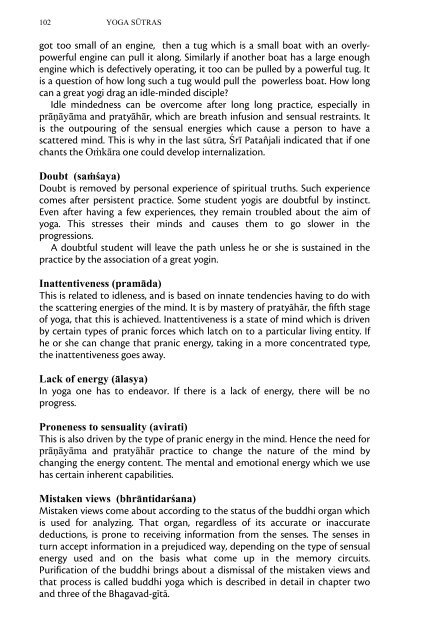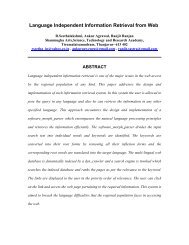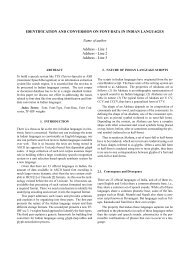You also want an ePaper? Increase the reach of your titles
YUMPU automatically turns print PDFs into web optimized ePapers that Google loves.
102 YOGA SŪTRAS<br />
got too small of an engine, then a tug which is a small boat with an overlypowerful<br />
engine can pull it along. Similarly if another boat has a large enough<br />
engine which is defectively operating, it too can be pulled by a powerful tug. It<br />
is a question of how long such a tug would pull the powerless boat. How long<br />
can a great yogi drag an idle-minded disciple?<br />
Idle mindedness can be overcome after long long practice, especially in<br />
prāṇāyāma and pratyāhār, which are breath infusion and sensual restraints. It<br />
is the outpouring of the sensual energies which cause a person to have a<br />
scattered mind. This is why in the last sūtra, Śrī Patañjali indicated that if one<br />
chants the Oṁkāra one could develop internalization.<br />
Doubt (saṁśaya)<br />
Doubt is removed by personal experience of spiritual truths. Such experience<br />
comes after persistent practice. Some student yogis are doubtful by instinct.<br />
Even after having a few experiences, they remain troubled about the aim of<br />
yoga. This stresses their minds and causes them to go slower in the<br />
progressions.<br />
A doubtful student will leave the path unless he or she is sustained in the<br />
practice by the association of a great yogin.<br />
Inattentiveness (pramāda)<br />
This is related to idleness, and is based on innate tendencies having to do with<br />
the scattering energies of the mind. It is by mastery of pratyāhār, the fifth stage<br />
of yoga, that this is achieved. Inattentiveness is a state of mind which is driven<br />
by certain types of pranic forces which latch on to a particular living entity. If<br />
he or she can change that pranic energy, taking in a more concentrated type,<br />
the inattentiveness goes away.<br />
Lack of energy (ālasya)<br />
In yoga one has to endeavor. If there is a lack of energy, there will be no<br />
progress.<br />
Proneness to sensuality (avirati)<br />
This is also driven by the type of pranic energy in the mind. Hence the need for<br />
prāṇāyāma and pratyāhār practice to change the nature of the mind by<br />
changing the energy content. The mental and emotional energy which we use<br />
has certain inherent capabilities.<br />
Mistaken views (bhrāntidarśana)<br />
Mistaken views come about according to the status of the buddhi organ which<br />
is used for analyzing. That organ, regardless of its accurate or inaccurate<br />
deductions, is prone to receiving information from the senses. The senses in<br />
turn accept information in a prejudiced way, depending on the type of sensual<br />
energy used and on the basis what come up in the memory circuits.<br />
Purification of the buddhi brings about a dismissal of the mistaken views and<br />
that process is called buddhi yoga which is described in detail in chapter two<br />
and three of the Bhagavad-gītā.










